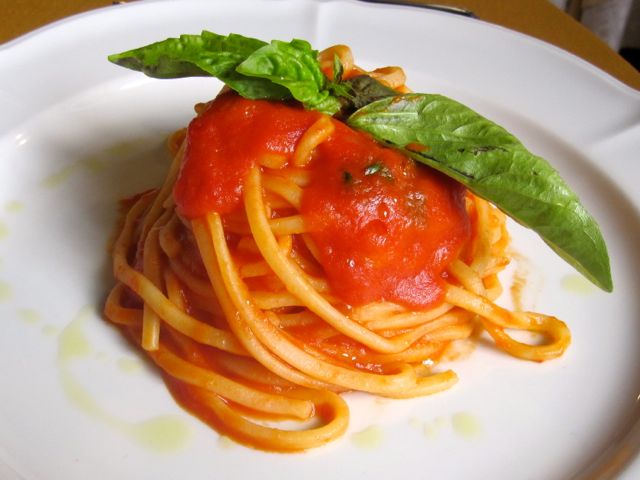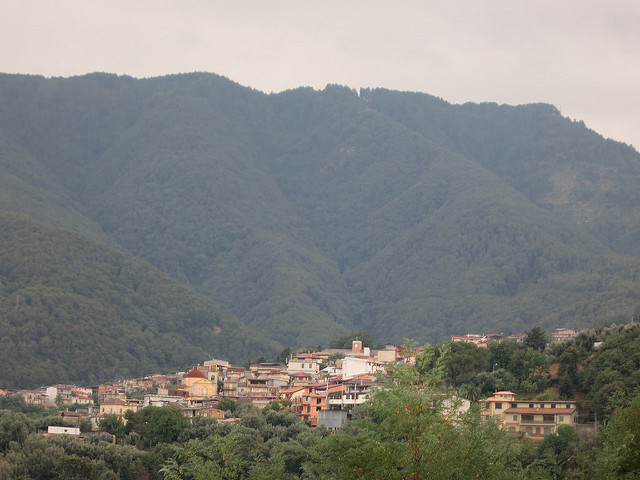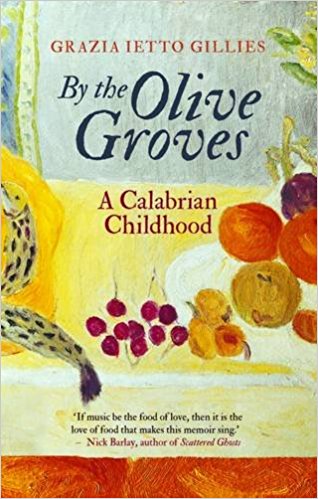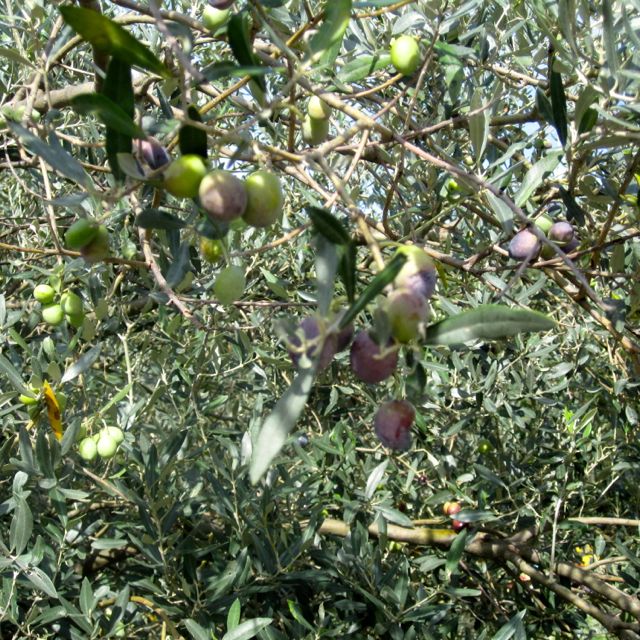“We were told in no uncertain terms that we were the type of people who wore shoes…” Grazia Ietto Gillies reminisces of her early life in By the Olive Groves, A Calabrian Childhood, a memoir that focuses on her time growing up in Delianuova, a hill town of southern Calabria.
Other children in the period during and after the Second World War went around barefoot or wore clogs, but Grazia came from what would have been considered a middleclass family in Delianuova. Everyone knew his or her place, and clothes were part of the order of things. Grazia spoke a dialect at home and learned the official Italian language of her country at school, an institution that wasn’t regularly attended by those poor shoeless children who had to help their parents in the fields.
Today, the children of Delianuova all wear shoes and go to school. They’ve done so for many years. Grazia only lived in the town for the first ten years of her life, and then visited in the summers up to adulthood. However, she looks back with a great nostalgia. She is now retired from her work as an academic economist, and I wonder why she has only returned a couple of times to the place that seems to have had such an impact on her life. What was the close connection?
FOOD
In her book as in her life, food plays an important role. Although not a cookbook, she includes over fifty recipes, not elaborate descriptions with photos and detailed measurements, but basic summaries of her mother’s preparations. They are reminiscences of the simple, but wholesome food she ate as a child.
From easy instructions for pasta sauces, such as the salsa di pomodoro (tomato sauce), to basic egg and vegetable dishes, Grazia recounts these uncomplicated recipes in plain terms, as would a nonna (grandmother). Start with a handful of ingredients, mix this, fry that and ecco fatto (that’s it)!
These recipes accompanied the family to Rome where they moved to expand their business, and then to London with Grazia when she set up house with her British husband. They remained a link for her, even if ingredients were hard to come by.

Spaghetti al pomodoro
FAMILY
In Italy, food and family are intrinsically connected. In Grazia’s case, she had fifty cousins all growing up in Delianuova. They played together, many of their parents worked together, and very often, they ate together.
When her immediate family relocated to Rome, the extended family soon followed. Their living quarters, modest at first, with relatives sharing apartments, grew to more spacious residences with uncles, in-laws and cousins all under one roof.
EMIGRATION FROM DELIANUOVA, CALABRIA

Delianuova, photo by Jeff Robinson
Very few members of Grazia’s family left Italy. They weren’t economically constrained to do so, although many from Delianuova were. Even the move to Rome was by choice.
Interestingly, she recounts that when a male family member went off to the United States or northern Europe, he was referred to as a sperduto, or lost in the sense of disoriented or isolated. The thought was that these individuals were going to a place where they would forget their former existence. However, going as far as Australia or South America brought the label perduto, a loss without hope. The family in all likelihood had no expectation of ever seeing the émigré again.
In the end, Grazia, too, became a sperduta. If her family had stayed in Delianuova, who knows how they would have fared economically, but they chose to make their way elsewhere, not America, Canada or Australia, but Rome. Grazia landed in London, not so far, really, but as she says, “In the last few decades, I have visited Delianuova very often through my imagination and memories but rarely in person.” She admits to seeing Delianuova as it was, without the economic, social and cultural changes that have affected the town and its people.
For example, I was surprised to read her reference to the chapter entitled “Americana Americana” from my book Calabria: The Other Italy. Calabrians repeated the word to emphasize I was in some way a “real” American, as opposed to an Italian-American. In telling the story, Grazia used the dialect, Mericana Mericana. Although most still speak various dialects, almost all Calabrians also speak Italian now, which they would have used with a foreigner. Times have changed.
RETURN TO CALABRIA
 Grazia’s family had mixed feelings towards Delianuova and its people. As a child, she longed to spend her summer vacations in her hometown, to experience the “free village life,” as she called it. However, she wasn’t immune to the ambivalence her elders felt with regard to the people and the place of her childhood. Grazia alludes to their having a “sense of fear and hostility towards them.” Could the malocchio have played a part? The evil eye of jealousy?
Grazia’s family had mixed feelings towards Delianuova and its people. As a child, she longed to spend her summer vacations in her hometown, to experience the “free village life,” as she called it. However, she wasn’t immune to the ambivalence her elders felt with regard to the people and the place of her childhood. Grazia alludes to their having a “sense of fear and hostility towards them.” Could the malocchio have played a part? The evil eye of jealousy?
Uprooting oneself for whatever reason can be dramatic, particularly when so entrenched in a place and its culture. Reading By the Olive Groves, A Calabrian Childhood, I felt that Grazia carried with her these unresolved feelings, thus her need to revisit her early years in Calabria by way of this book. Return to Delianuova? Of course, who wouldn’t want to be eating that fresh cheese and handmade pasta or the delicacies from her relative’s award-winning pastry shop surrounded by 100 close family members? This is assuming you’re one of the lucky ones with shoes.
By the Olive Groves, A Calabrian Childhood by Grazia Ietto Gillies was published in hardcover early in 2017 by I. B. Tauris, London, and I was graciously sent a copy from which I prepared this blog post. More information about Grazia and her works can be found on her website Grazia Ietto Gillies.
Photo of Delianuova in the Province of Reggio Calabria, courtesy of Jeff Robinson.
Interested in South Italy and Calabria today? Read more about this fascinating southern Italian region in Calabria: The Other Italy, my nonfiction, award-winning book that explores daily life, culture, history, the arts, food, society and tourism of Calabria, Italy.
“Like” Calabria: The Other Italy’s Facebook page for more beautiful pictures and information.
Sign up below to receive the next blog post directly to your email.

Comments 3
Although I was in the town of Trenta Last summer visiting the house of my grandmother I was unable to get to Delianuova to visit my grandfather’s home. There is very little known about his background and home in Delianuova by my family and I only know about it since I have become a dual citizen through my maternal grandfather who had this town listed on his passport. I would love to travel to this town some day to see this area.
Author
You would enjoy it as there is much to see in Southern Calabria.
Delianuova is an emerald in the aspromonte.They call the door of this mountain.TOWN OF ARTIST AND GENETICALLY SMART PEOPLE. Nice and polite are the citizen and proud of their heritage.Who love this town are many disperse in every county of America, Canada Australia etc.But don’t believe me ,please go and visit it. Im sure you will be emotionally satisfied and you have accomplished what your hearth is looking for